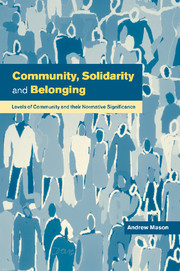Book contents
- Frontmatter
- Contents
- Acknowledgements
- Introduction
- Part 1 Community and its value
- Part 2 Political community in a culturally diverse society
- 3 Liberal political community and illiberal minorities
- 4 Republican political community
- 5 National community: the benefits of a sense of belonging together
- 6 Multicultural education for an inclusive political community
- Part 3 Political community and the limits of global community
- Conclusion
- Bibliography
- Index
3 - Liberal political community and illiberal minorities
Published online by Cambridge University Press: 22 September 2009
- Frontmatter
- Contents
- Acknowledgements
- Introduction
- Part 1 Community and its value
- Part 2 Political community in a culturally diverse society
- 3 Liberal political community and illiberal minorities
- 4 Republican political community
- 5 National community: the benefits of a sense of belonging together
- 6 Multicultural education for an inclusive political community
- Part 3 Political community and the limits of global community
- Conclusion
- Bibliography
- Index
Summary
What kind of community, if any, is valuable at the level of the state and what steps may the state legitimately take to promote or preserve it? In answering this question, liberal theorists have developed a vision of political community which they believe could be realized without unjustifiably restricting the liberty of citizens because it would be founded upon a conception of justice that was acceptable to all. I shall lay out this ideal, before piecing together the most promising correlative account of how conflicts should be resolved when they arise between it and communities (in the ordinary sense) below the level of the state. In the two subsequent chapters, I shall take a more critical look at the liberal vision itself.
Liberal political community
Some liberals appear to reject the idea that political community can be achieved, or even legitimately pursued, in a society marked by pluralism. John Rawls, for example, says that the hope of political community must be abandoned ‘if by such a community we mean a political society united in affirming the same comprehensive doctrine. This possibility is excluded by the fact of reasonable pluralism together with the rejection of the oppressive use of state power to overcome it.’ In Rawls's view, if political community involves convergence on some particular ‘comprehensive doctrine’, then it cannot be sustained without oppression in any society which displays ‘reasonable pluralism’. But community, as I have characterized it, does not require its members to converge on what Rawls calls a comprehensive doctrine.
- Type
- Chapter
- Information
- Community, Solidarity and BelongingLevels of Community and their Normative Significance, pp. 67 - 95Publisher: Cambridge University PressPrint publication year: 2000



